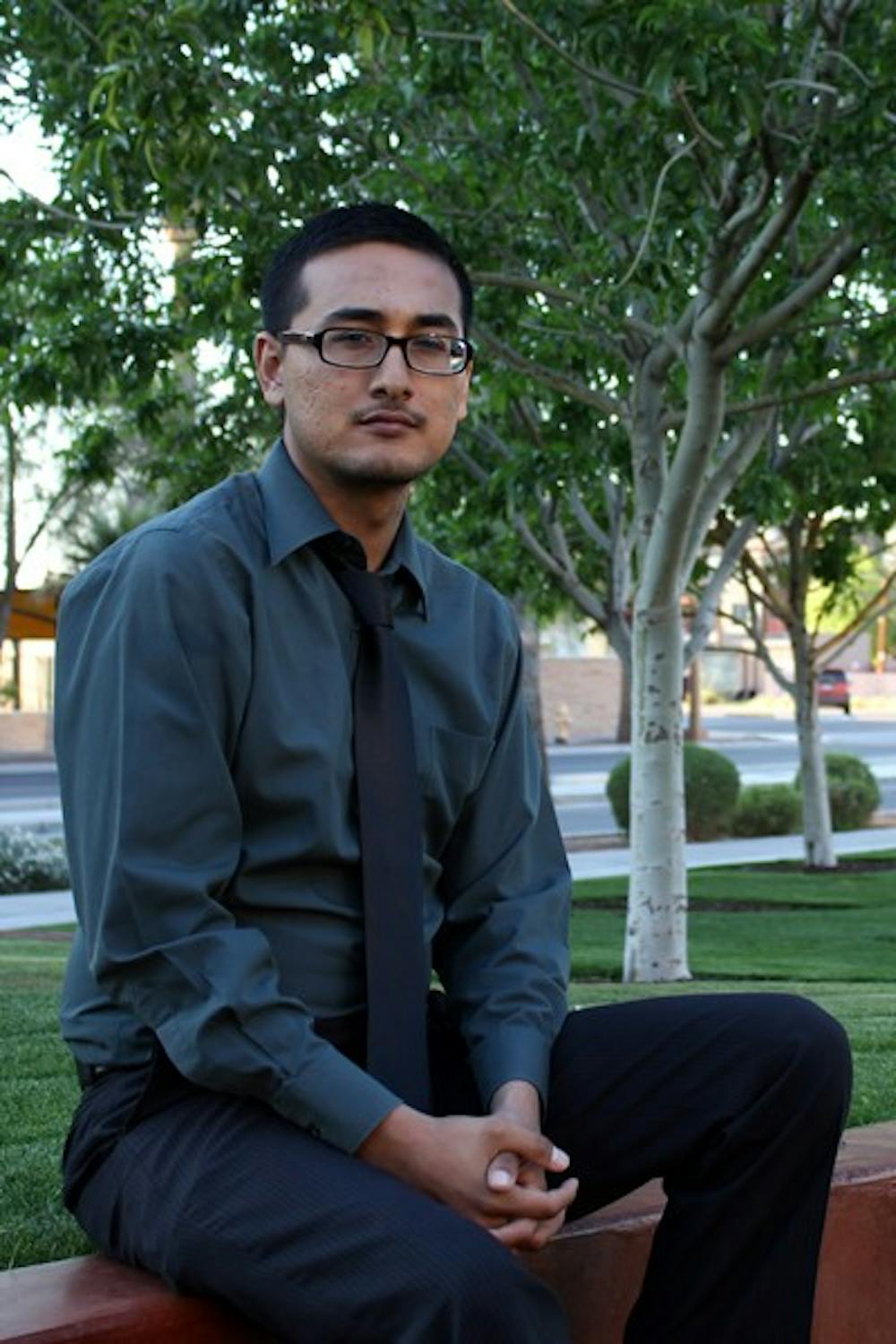 Daniel Rodriguez does not qualify for financial aid due to Proposition 300, passed in 2007, which prevents students who cannot prove they are in the U.S. legally from receiving financial aid. (Photo by Jenn Allen)
Daniel Rodriguez does not qualify for financial aid due to Proposition 300, passed in 2007, which prevents students who cannot prove they are in the U.S. legally from receiving financial aid. (Photo by Jenn Allen)Daniel Rodriguez earned several scholarships to study political science and English literature after he was accepted into ASU in 2004.
In order to complete his law degree, however, he is forced to raise funds to pay the remainder of his tuition.
“I am undocumented, a dream student,” Rodriguez said. “People need to know why I can’t get a scholarship. No tengo papeles (I don’t have any papers), but I still feel American.”
Rodriguez was a junior when Proposition 300 passed in Arizona, which demanded him to pay for out-of-state tuition and stop receiving state financial aid.
Rodriguez was born in Monterrey, Mexico. When he was 6 years old, his mother, Evangelina Montolongo, fled with Rodriguez and his two sisters to Arizona.
“One day I was playing on the street when my mom grabbed me and said, ‘Come on, we’re leaving,’” he said. “Two days later, we ended up in Phoenix.”
Rodriguez began attending elementary school immediately after arriving in the U.S.
Montolongo said it took him a whole year to learn English.
“(Moving here) was a drastic change for Daniel,” Montolongo said in Spanish. “He didn’t even know kids at school were taunting him. I wanted him to learn.”
Rodriguez had not thought about furthering his education until high school, when his mother encouraged him apply to a university.
“I didn’t know what being undocumented meant until a counselor said I shouldn’t even consider college because of my status and should go get a job,” he said.
Discouraged, Rodriguez started working as a dishwasher and almost dropped out of high school until another counselor enrolled him in honor classes and advised him to get more involved at school.
He went on to become the president of Trevor Browne High School’s Movimiento Estudiantil Chicano de Aztlán, the Black Student Union and the Gay-Straight Alliance.
“I got involved in all these clubs because I needed a résumé to go to school,” Rodriguez said. “But it was because of these clubs that I learned what it meant to be Latino, to be undocumented.”
After being accepted into ASU, Rodriguez obtained merit-based scholarships covering all of his tuition from 2004 to 2006 allowing him to save extra money.
“I was a junior when Prop. 300 passed,” he said. “It took away most of my scholarships, but I was able to graduate because of the money I had saved.”
The referendum prohibits college students from receiving any state financial assistance if they could not prove they were lawfully present in the U.S.
He remembered that his paternal grandmother was born in Texas, which would make his father an American citizen.
Evelyn Cruz, an immigration law professor at the Sandra Day O’Connor College of Law, said this realization would not help him even in his extraordinary circumstances because he is now 25 years old.
“The government must interpret the statute as written,” Cruz said. “If (there is) no legitimization before 18, then (there is) no acquisition of citizenship.”
Rodriguez was the first in his immediate family to graduate college.
“It was really liberating to take ownership of what we were going through,” he said.
He was named most outstanding graduate at the 2008 ASU Hispanic Convocation.
“I feel so proud and thankful of what he’s become,” Montolongo said. “All of our sacrifices were worth it when he graduated college.”
The first year he attended the Sandra Day O’ Connor College of Law, Rodriguez was able to maintain one of his scholarships and worked to pay for the remaining tuition.
He co-founded the Arizona Dream Act Coalition in 2008, an alliance of organizations working toward the passage of the Development Relief and Education for Alien Minors Act.
The Dream Act legislative proposal was first introduced in 2001 and was re-introduced in 2011. Under its provisions, undocumented youth could be eligible to become citizens if they complete a college degree or two years of military service.
Rodriguez took a leave of absence in 2009 in order to work and raise money for his education.
“I risk losing my first year if I don’t go back in the fall,” he said. “There are virtually no scholarships for law students in my situation.”
Rodriguez hopes that through personal contributions on his website and one or two private scholarships, he will be able to go back to school this year.
“My belief is, if I put my story out there, the community will see and understand,” he said. “They will want to help me and others like me.”
Reach the reporter at dpbaltaz@asu.edu




